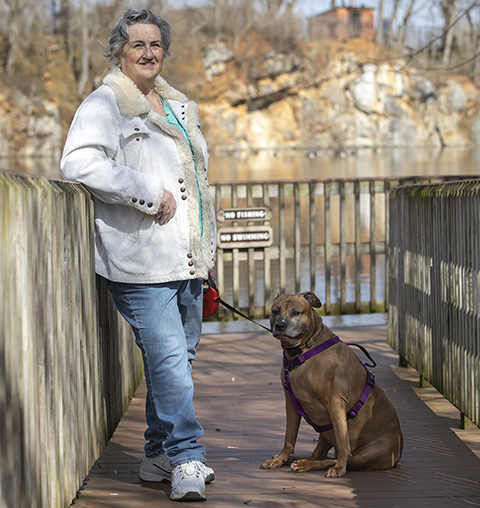Acid Reflux Surgery: Arlene's Story
Arlene Peters worked in a bakery for 30 years before retiring in 2004 to spend time with her two daughters and six grandchildren. Since the 1970s, however, Arlene has been plagued by acid reflux and indigestion.
“I’d go to bed every night with a thermos of milk on my nightstand to handle the heartburn," said Arlene, who lives in Frederick, Md.
Acid reflux happens when stomach acid backs up into the esophagus, the tube that runs from the mouth to the stomach. The stomach acid irritates the esophagus, causing heartburn and other unpleasant symptoms. Arlene was also suffering from a large hiatal hernia, a condition in which the stomach can rise up into the chest cavity making it more difficult to breathe, and exacerbating her indigestion.
Over time, Arlene eliminated spicy foods, onions and caffeinated beverages from her diet and tried every possible medication to control her symptoms. For the last 10 years, she didn’t go anywhere without a small bag in her pocket to handle frequent spit-ups and vomiting.

Arlene Peters underwent minimally invasive robotic-assisted surgery at Holy Cross Germantown Hospital to repair her hiatal hernia and implant the LINX device to treat her heartburn. Arlene says, "I'm thrilled. I'm so glad I finally got this taken care of. I'm smiling ear to ear."
A New, Effective Solution
Finally, Arlene had enough. Her doctor suggested she see thoracic robotic surgeon Bryan Steinberg, MD, chair, Robotics Committee, Holy Cross Health. Dr. Steinberg recommended she have a minimally invasive procedure to repair the hiatal hernia and implant the LINX© Reflux Management System, an innovative new technology designed to treat acid reflux. The device itself is a ring of magnetic beads placed around the esophagus that restores the natural function of the esophagus, allowing food to travel into the stomach, then tightening at the bottom to prevent stomach acid from coming back up.
When used in conjunction with a hiatal hernia repair, the LINX device has eliminated the need for a Nissen fundoplication, a surgical procedure that narrows the esophageal opening by wrapping the stomach around the bottom of the esophagus. The LINX implant does not alter the anatomy, making the surgery and outcome much better tolerated and comfortable for patients.
"The benefit of this device is that it allows food to go down, but also allows things to come up if needed – a burp, for example, which a Nissen can block,” Dr. Steinberg said. “We would often trade the relief of heartburn for significant bloating and gas pain. Now people can resume a normal lifestyle, eat what they like and get off of Proton Pump Inhibitors which have been associated with anemia, heart disease and the development of dementia. The heartburn program is changing people's lives.”
Digestive and Surgical Excellence
At Holy Cross Health, the pursuit of clinical excellence means vetting and deploying the latest diagnostic technologies and treatment modalities to help individuals achieve their best quality of life. Holy Cross Germantown Hospital is the first community hospital in Montgomery County and the third in Maryland to perform the LINX procedure. This spirit of innovation informs the hospital's region-leading digestive health program, which helps patients live a life free of heartburn, and treats the full range of stomach and colorectal health challenges. The program’s multispecialty approach is supported by Holy Cross Health’s robust diagnostic and robotic surgery capabilities.
After consulting with Dr. Steinberg, Arlene opted to have the device implanted. “Dr. Steinberg is fantastic. He takes his time with patients, he listens, and he addresses concerns,” she said. “You don’t feel like you’re rushed with him, which makes a big difference.”
Treatment that Transforms Life
In September 2018, Arlene underwent minimally invasive robotic-assisted surgery at Holy Cross Germantown Hospital to repair her hiatal hernia and implant the device. “Everyone was so nice at the hospital,” she said. “My pain was well controlled, and I even had a bit of an appetite in the evening after my surgery.” Arlene was able to return home the following day.
Within a few days, Arlene began to notice a big difference. She had no indigestion and no reflux, and since the surgery, she has not had to worry about getting sick in public or feeling the awful sensation of stomach acid churning up into her throat. She no longer needs medication to control her acid reflux, and she feels great. She can even eat spicy foods and onions again.
“Arlene suffered with acid reflux for a very long time. This surgery was transformative for her in terms of quality of life, and that’s a wonderful thing,” Dr. Steinberg said.
Arlene noticed other significant improvements following her surgery. Since the hernia repair, she is able to breathe much more easily, and can walk up and down hills without needing to stop and catch her breath.
“I’m thrilled,” Arlene said. “I’m so glad I finally got this taken care of. I’m smiling ear to ear.“
